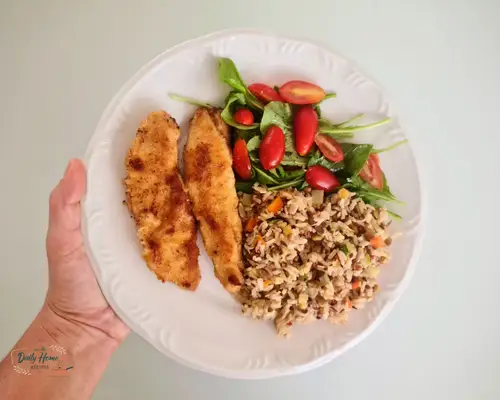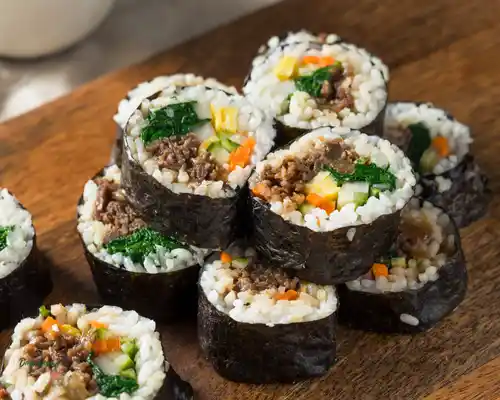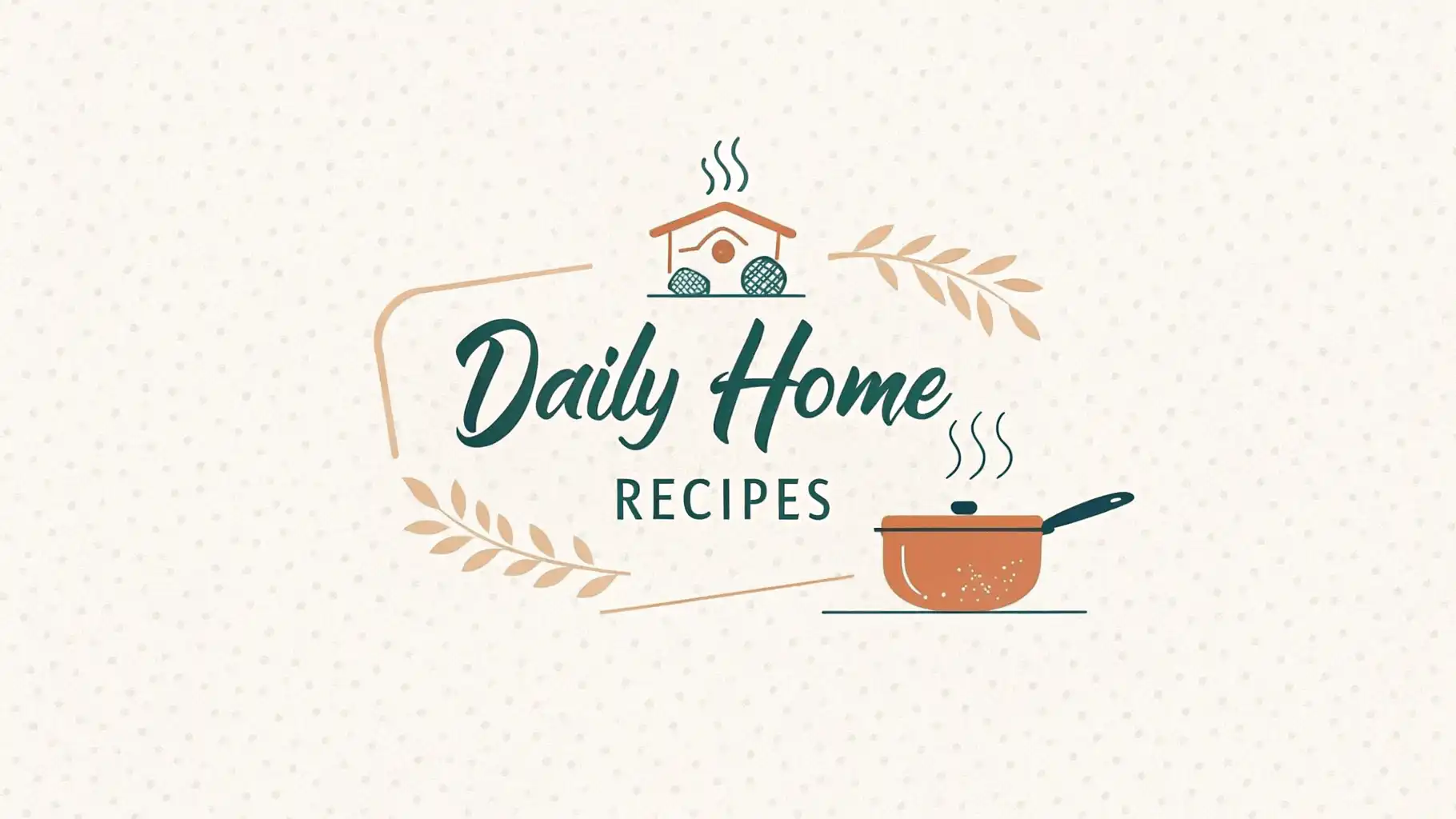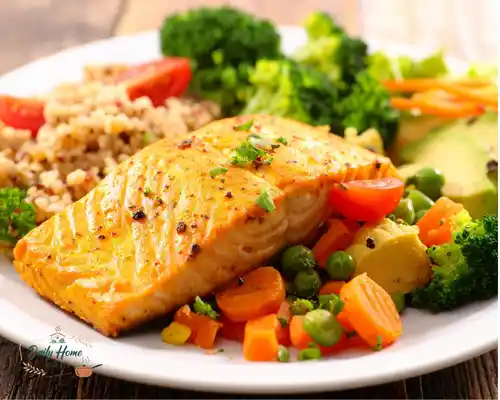High-Protein Dinner Routines aren’t about perfect meal prep. They usually start with a familiar moment that early-evening tension when you’re done working (technically) but still mentally spinning. Your stomach nudges you , You know you should eat something with enough protein so you don’t crash later or wake up starving at 2 a.m. But thinking about what to make feels… heavy.
This is the gap no one talks about. Between intention and action. Between “I want to eat well” and “I literally cannot think right now.”
So here’s a different idea: what if dinner wasn’t another box to check, or a performance of wellness, or a Pinterest board goal? What if it was just… a soft landing? A quiet decision that says, I matter, even when I’m tired. Especially then.
This isn’t a guide to perfect meal planning. It’s not going to pretend you have time to prep quinoa bowls every Sunday. What it will give you is something more real: routines that forgive you. That flex. That fit your actual life the messy, busy, beautiful one you’re building.
We’ll walk through:
- What it looks like to treat cooking as care, not punishment
- How high-protein dinners can support your energy (without draining your soul)
- Why sticking to habits has less to do with willpower and more to do with emotional momentum
- And how four real working women in very real-life chaos are making it work in ways that don’t suck the joy out of eating
If dinner has felt like a battleground lately… maybe this can be a truce.
Cooking as Self-Care: Reframing Dinner as Empowerment
Sometimes I catch myself treating dinner like another checkbox. Emails done. Workout maybe. Dinner… ugh. It’s like the thing that should restore me somehow ends up feeling like a test I’m about to fail. Too tired to chop. Too guilty to order in. And the protein thing? Another layer of pressure.
But if I’m honest, the nights when I do pause even for 10 minutes and put something halfway decent on a plate , everything feels different It’s not the food so much as the message behind it , “I matter enough to feed myself well, even when I’m tired” That’s not discipline; that’s a small act of self‑respect.
The quiet power of a protein‑rich meal
People talk about protein like it’s purely physical muscles, macros, metabolism. Sure, that’s true. But the other part no one really mentions is how it steadies you. A decent, protein‑heavy dinner can keep you from that weird 9 p.m. crash‑and‑snack spiral. You’re calmer. Your brain stops buzzing quite so loud. It’s like your body sighs and says, “okay, we’re good.”
Small gestures that shift the day
And it doesn’t have to be this big “cook from scratch” performance. Sometimes I just grab leftover chicken and make a wrap. Sometimes it’s eggs at 8 p.m. with toast. Not glamorous. Not Instagram. But it changes the evening. Because it’s a choice one that says I’m still looking after myself, even on the hard nights.
Why even bother reframing dinner?
Because otherwise it stays a chore. And when dinner’s just a chore, you skip it or resent it. When it becomes a ritual even a tiny one it softens the edges of your day. It’s not about protein for protein’s sake. It’s about the feeling you build around it: steadiness presence, a small anchor in the noise.
Avoiding Burnout: Food That Fuels Your Work Week
There’s a version of me that thinks I should have dinner all figured out by now prepped, balanced, full of protein, weekday-ready. But most weeks? That version of me barely makes it past Monday.
Burnout doesn’t always announce itself loudly. Sometimes it’s just a slow unraveling forgetting to eat lunch, powering through the afternoon on caffeine, and then coming home too fogged out to cook anything remotely nourishing. You tell yourself it’s just one day. Then it’s Thursday and you’ve been surviving on snacks and sheer willpower.

Protein isn’t just for the gym
When you’re low on protein, your energy dips weirdly. You get snappy. Your focus slips. You crave sugar not because you’re weak, but because your body’s begging for fuel it can actually use. Protein slows that spike-crash loop and gives you steadier energy through the evening. And it’s worth remembering that protein doesn’t always have to come from meat. [Vegetarian high-protein dinners] can be just as satisfying, especially on nights when heavy cooking feels like too much.
Think of it as buffer food. It doesn’t fix your whole day, but it gives you a little more margin. A little more steadiness when your bandwidth is toast.
So what does that look like, realistically? Not gourmet. Not complicated. Just food that doesn’t ask much of you. On nights when even standing at the stove feels like too much, tools that do the heavy lifting can make a real difference. An air fryer, for example, can turn simple ingredients into satisfying meals in minutes. [Air fryer protein dinners] often become the easiest way to get enough protein without draining what little energy you have left.
Here are some I keep on rotation:
Pre-cooked lentils + greens + eggs (7 minutes, tops)
Rotisserie chicken + microwave rice + salsa
Greek yogurt + hemp seeds + nut butter dinner? Yep.
Tuna + white beans + lemon + olive oil
Some nights, “dinner” is whatever I can assemble with one hand while scrolling Slack. And honestly? That still counts. You don’t have to earn protein. You just have to let it support you.
What’s the link between burnout and dinner?
Dinner often becomes the first thing to collapse when your energy runs out — and that collapse reinforces burnout. When you eat in a way that steadies you (think protein, not just carbs), it’s not just nutrition. It’s protection. A tiny shield against total depletion.
How to Stick With It: Mindset, Motivation, & Momentum
Here’s the truth no one really says out loud: motivation doesn’t magically appear after work. In fact, it usually vanishes right around 5:30 p.m., somewhere between your last email and the moment you realize you forgot to defrost anything.
So if your plan for high-protein dinners depends on motivation? You’re already set up to fail.
Momentum > motivation
The trick if there is one is building routines that don’t need you to feel inspired. You just do them because they’re there, ready, easy enough. Think pre-assembled grocery kits. Or making the same three meals every week until you’re bored enough to care again. It’s not lazy. It’s smart.
The real magic is momentum. When one decent dinner leads to another. When you start to trust, even just a little, that you can take care of yourself consistently not perfectly, but enough.
Tiny decisions, big shifts
The mindset isn’t “I’ll get my life together.” It’s more like, I’ll feed myself well tonight. That’s all. Maybe you start lighting a candle while you cook. Maybe you keep your favorite mug near the stove to sip while things sauté. These things seem small and they are but they build emotional association. Warmth. Permission. Something to come back to.
Here’s a list I’ve used (and tweaked) when everything felt like too much:
“Default dinners” list on the fridge (3 meals that are always okay)
A protein go-to in the freezer (turkey burgers, salmon, edamame)
Grocery list in Notes app titled: “For tired me”
One night a week that’s always takeout, guilt-free
It’s not about never falling off. It’s about making it easier to get back on.
How do you stay consistent when life is chaotic?
You don’t. Not in the traditional sense. You stay connected. To yourself, to your energy, to what you need that day. Consistency isn’t rigid. It’s flexible, forgiving, and ironically that’s what makes it last.
4 Example Routines from Working Women (Quotes/Scenarios)
Sometimes the best advice doesn’t come from experts it comes from the people living it. So instead of another list of “easy protein dinners,” here’s what real women are actually doing to feed themselves decently during a workweek that doesn’t slow down.

1. Janelle, 34 – Single mom, graphic designer, post-bedtime lifeline
“By the time my kid’s in bed, I have maybe 10 brain cells left. I don’t ‘cook’ as much as I… assemble. My go-to? Cottage cheese, frozen berries, protein granola. It feels like dessert, but it’s solid. I sit on the couch, exhale, and that is dinner.”
Why it works:
- No stove required
- High protein without cleanup
- Feels like a treat = mental reward
2. Marisa, 29 – Corporate consultant, gym at 7 p.m., dinner at 9
“I batch-cook chicken thighs on Sunday, then just rotate sides microwave broccoli, sweet potato, hummus, whatever’s in the fridge. It’s boring. But it keeps me from grabbing drive-thru after the gym, which always ruins my sleep anyway.”
Why it works:
- Protein is prepped in bulk
- Flexible mix-and-match
- Post-workout recovery built in
3. Nadia, 41 – Hybrid worker, ADHD, 4-year-old who only eats beige food
“I have about a 20-minute window between daycare pickup and meltdown hour. I survive on snack plates turkey rollups, edamame, boiled eggs, crackers, carrots. My kid eats the crackers. I eat the rest. Somehow, it counts.”
Why it works:
- No cooking = no stress
- Same ingredients, different use for her and the kid
- Gentle structure, no pressure
4. Britt, 37 – Freelance copywriter, burnout recovery mode
“I used to beat myself up for ordering takeout twice a week. Now I just plan for it. Tuesday is sushi night I get sashimi and miso soup and call it protein-rich self-care. I even light a candle. Ritual makes it feel like a choice, not failure.”
Why it works:
- Built-in relief valve
- High-protein takeout reframed as intentional
- Ritual = emotional nourishment
If You’re Still Thinking About This…
Honestly, sometimes just reading about routines isn’t enough you want examples. Or clarity. Or maybe just a sense that you’re not totally winging it. If that’s where your brain’s at, these pieces might actually help:
Office-Friendly High-Protein Dinners
Not everyone has time to cook and meal prep. This is for when your dinner needs to survive the work fridge and still taste decent at 1 p.m. the next day.
Dinners That Double as Post-Workout Recovery Meals
Because let’s be real after you train, you don’t want to “figure out macros.” You just want food that helps your body recover without thinking too hard.
Macros 101: How Much Protein Do You Really Need?
- Look, the numbers aren’t everything. But if you’re curious or kinda confused about how much protein actually makes a difference… this breaks it down, simply.
Not required reading. Just options for whatever kind of night (or mindset) you’re in.
One Last Thing, Before You Close This Tab
If you’re still here, maybe it’s not just about protein. Maybe it’s about finally wanting your evenings to feel a little less chaotic. Or not waking up tomorrow thinking, “I should’ve eaten something better last night.” Or maybe you’re just… tired of feeling tired.
And yeah, high-protein dinners help. They really do. They give your body something solid to work with steadier energy, fewer mood swings, less of that weird 9 p.m. hunger spiral. But more than that? They’re proof. Tiny, quiet proof that you showed up for yourself. That you didn’t skip your own needs again.
You’re not going to nail this every night. Honestly, I hope you don’t. That’s not the point.
The point is when you can to choose meals that feel like care. Even if they’re not pretty. Even if they come from the freezer. Even if all you did was not skip dinner for the third night in a row.
That counts. It really does.


Leave a Reply